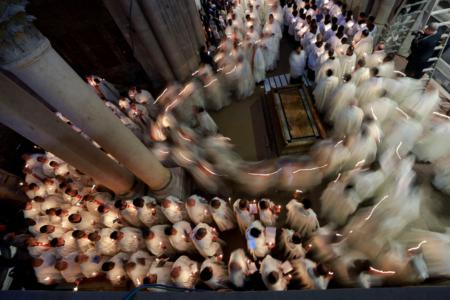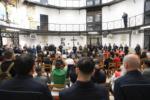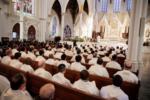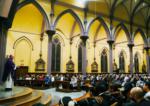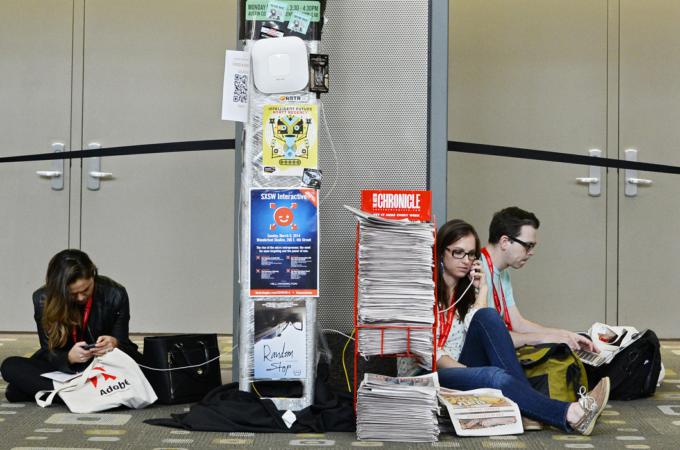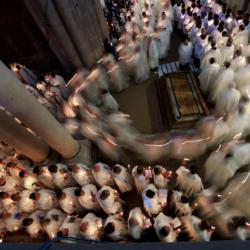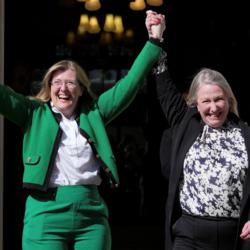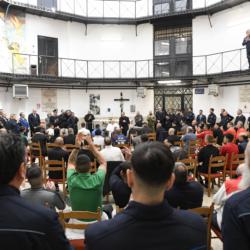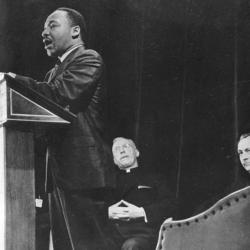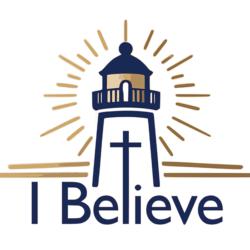Church urged to 'feed the sheep where they are' -- on the internet
NEW YORK (CNS) -- The digital world is the richest, most challenging and limitless territory for evangelization ever devised, but Catholic communicators must be professional, creative and empathetic to realize its full potential.
That was the view of speakers at a July 6 Catholic Digital Communications Conference at Jesuit-run Fordham University.
They examined myriad ways to use social media and the internet to spread the faith to nonbelievers and help believers grow in their understanding and practice.
Digital communicators have the privilege to be missionaries and evangelists, according to Elizabeth Scalia, editor-in-chief of the Catholic online magazine Aleteia.org. "The internet is the place where everyone thinks they already know everything," she said. Proselytizing is folly and the most successful missionary efforts are those most like Christ incarnate, where the evangelist is fully present to others, "even when the presence is so strangely virtual and textual," Scalia said.
"Try hard to dismiss no one," she said. Be positive, listen, laugh and pray, she advised, and attract people with a nonconfrontational approach that allows the Holy Spirit to work. The technique mirrors the advice of Popes Benedict and Francis to create an encounter with Jesus Christ and feed the sheep where they are, which today is the internet, she said.
Scalia said gentle evangelization is "effective to the peripheries. People lurking there take away good and bad impressions." She and other speakers described people returning to the sacraments after thoughtful consideration of discussions online.
Jesuit Father Sam Sawyer, associate editor and director of digital strategy at America Media, said Catholic communicators who try to measure their effectiveness must think carefully about who they are trying to reach. He said they should pray with their analytics and have a conversation with God about what the numbers mean.
Father Sawyer said cloud-based services drastically decrease entry barriers to the digital world and make it easier for groups to establish websites and blogs. He said expertise is the limiting factor now, because some people think effective communication "can be done part time or as an afterthought." Digital communication, like print, is a real job that requires time, energy and attention to work well, he said.
The digital world is particularly well-suited to youth, speakers said, and can strengthen their faith. Veteran communicators must resist the urge to tell young people what to do and how to do it. "God has not been idle with the young. God is already doing something in that young person's life and you have the opportunity to strengthen it," Father Sawyer said.
The church is challenged to communicate with its diverse adherents without adopting a least-common-denominator sameness, Father Sawyer said. "The universality of the church can be dramatically appealing to young people; conformity is not," he said.
"This is our internet parish," John Harper said as he held up his smartphone. Harper is host of "Morning Air" on Relevant Radio Network. "This is a wonderful device the Holy Spirit has given us. There are more wireless phones than people in the United States and most Americans listen to audio on line," he said. "Unlike the doors of my church, the smartphone is not locked at 3 p.m."
"Priests are reaching people through Facebook, Twitter and a three-minute 'Sermon on the App,'" Harper said. He suggested people practice digital tithing, which he defined as using 10 percent of social media posts to evangelize.
Juan Della Torre, founder and CEO of La Machi, a communications and public relations agency, said from a marketing perspective Christianity is the most successful branding campaign on earth, because so many people recognize the cross and associate it with Jesus Christ.
Catholicism was a historic leader in communication but has lost ground because of a gap with modern culture and difficulty reaching youth, he said, adding that Catholic communicators should be creative, professional and speak from the heart.
"Many organizations have nothing to say, but do well and market themselves successfully. We have a lot to say, but sometimes we don't do our best to attract attention," Della Torre said.
Jesuit Father James Martin, editor at large of America magazine who has more than half a million followers on social media, described his experiences with evangelization in the digital world.
The daylong event was organized by the Pope's Worldwide Prayer Network, formerly known as the Apostleship of Prayer. The network showcased Click to Pray, a multilingual app launched in March 2016 to encourage users to pray for the intentions of the pope and for the intentions of other people posted on a virtual prayer wall. It also reminds users to pray three times a day. More than 250,000 people have downloaded the app.
The event also premiered a 90-second video in which Pope Francis announced his July prayer intention urging respect for indigenous peoples.
Jesuit Father James Kubicki, national director of the Pope's Worldwide Prayer Network, introduced the speakers, including Jesuit Father Frederic Fornos, international director of the Pope's Worldwide Prayer Network. Father Fornos said Click to Pray promotes a culture of encounter, opens people's hearts and links them to the great challenges facing the world.
- - -
Editor's Note: Click to Pray is available at http://clicktopray.org. It is available in English, Spanish, Portuguese and French, in both iOS and Android formats.
